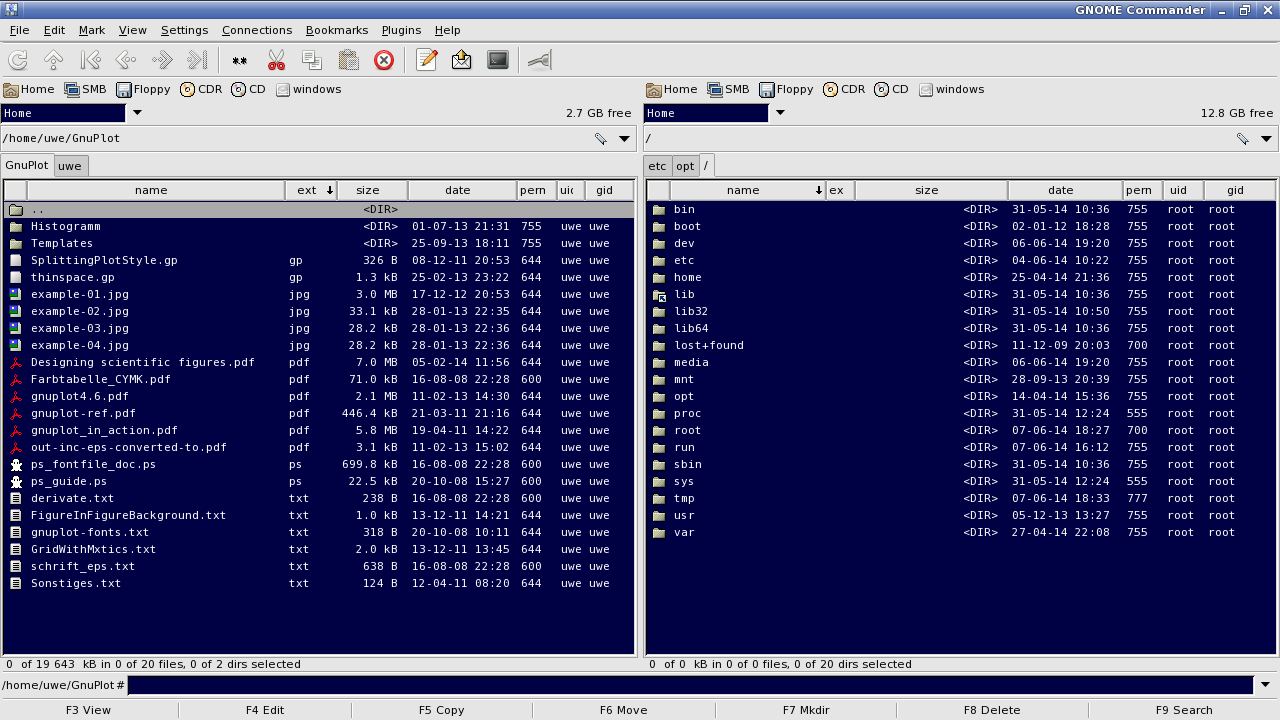GNOME Commander is a fast and powerful graphical file manager for the GNOME desktop environment.
The user interface is based on the orthodox file manager (OFM) principle, also known as Commander-like file managers, the family of file managers based on the venerable Norton Commander interface, such as Midnight Commander.
The software is built on the GTK-toolkit and GnomeVFS. GNOME Commander aims to fulfill the demands of more advanced users who like to focus on file management, their work through special applications and running smart commands.
Features include:
- GTK-2 Graphical User Interface with standard mouse interactions.
- Tabbing support.
- GNOME mime types (MIME-Type management under development).
- Right click mouse menu with the usual file operations to run, open, open with, delete or rename files and folders, and also to set properties like ownership and permissions.
- Mouse context menu that easily can be extended by entries calling any kind of external application like viewers, editors or custom scripts to work on selected files or directories.
- Quick device access buttons with automatic mounting and unmounting.
- Latest accessed folder history.
- Fast file viewer for text, images and image meta data (Exif and IPTC).
- Tools for searching, quick file name search in current dir, symlinking, comparing directories.
- A tool for advanced renaming of files supporting various types of meta-data.
- Folder bookmarks.
- File compression.
- Plugin support.
- Integrated command line.
- Python scripting.
- Supports: SMB/CIFS, WebDAV, NFS, FTP (using GnomeVFS ftp module), and SSH.
- Support for PDF metatags in advanced file rename templates.
- Support for single-click open mode.
- One instance mode.
- Support for 40 languages.
Website: gcmd.github.io
Support: Documentation
Developer: GNOME Commander team
License: GNU General Public License v2.0

GNOME Commander is written in C++. Learn C++ with our recommended free books and free tutorials.
Return to File Managers | Return to Orthodox File Managers
| Popular series | |
|---|---|
| The largest compilation of the best free and open source software in the universe. Each article is supplied with a legendary ratings chart helping you to make informed decisions. | |
| Hundreds of in-depth reviews offering our unbiased and expert opinion on software. We offer helpful and impartial information. | |
| The Big List of Active Linux Distros is a large compilation of actively developed Linux distributions. | |
| Replace proprietary software with open source alternatives: Google, Microsoft, Apple, Adobe, IBM, Autodesk, Oracle, Atlassian, Corel, Cisco, Intuit, and SAS. | |
| Awesome Free Linux Games Tools showcases a series of tools that making gaming on Linux a more pleasurable experience. This is a new series. | |
| Machine Learning explores practical applications of machine learning and deep learning from a Linux perspective. We've written reviews of more than 40 self-hosted apps. All are free and open source. | |
| New to Linux? Read our Linux for Starters series. We start right at the basics and teach you everything you need to know to get started with Linux. | |
| Alternatives to popular CLI tools showcases essential tools that are modern replacements for core Linux utilities. | |
| Essential Linux system tools focuses on small, indispensable utilities, useful for system administrators as well as regular users. | |
| Linux utilities to maximise your productivity. Small, indispensable tools, useful for anyone running a Linux machine. | |
| Surveys popular streaming services from a Linux perspective: Amazon Music Unlimited, Myuzi, Spotify, Deezer, Tidal. | |
| Saving Money with Linux looks at how you can reduce your energy bills running Linux. | |
| Home computers became commonplace in the 1980s. Emulate home computers including the Commodore 64, Amiga, Atari ST, ZX81, Amstrad CPC, and ZX Spectrum. | |
| Now and Then examines how promising open source software fared over the years. It can be a bumpy ride. | |
| Linux at Home looks at a range of home activities where Linux can play its part, making the most of our time at home, keeping active and engaged. | |
| Linux Candy reveals the lighter side of Linux. Have some fun and escape from the daily drudgery. | |
| Getting Started with Docker helps you master Docker, a set of platform as a service products that delivers software in packages called containers. | |
| Best Free Android Apps. We showcase free Android apps that are definitely worth downloading. There's a strict eligibility criteria for inclusion in this series. | |
| These best free books accelerate your learning of every programming language. Learn a new language today! | |
| These free tutorials offer the perfect tonic to our free programming books series. | |
| Linux Around The World showcases usergroups that are relevant to Linux enthusiasts. Great ways to meet up with fellow enthusiasts. | |
| Stars and Stripes is an occasional series looking at the impact of Linux in the USA. | |
